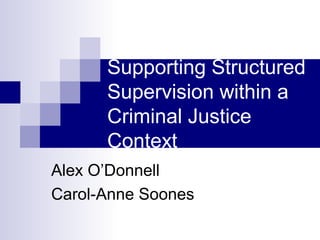
Presentation on a collaboration with London Probation Services WS72
- 1. Supporting Structured Supervision within a Criminal Justice Context Alex O’Donnell Carol-Anne Soones
- 2. Background SLC focus group Training needs snapshot Partnership with London Probation Service Exploring the Black Box of Community Supervision (Bonta,J)
- 5. What Works Principles for Effective Programmes - Skills oriented - Cognitive behavioural - Staff able to model pro-social behaviour - Multi–modal - Community based - Ongoing monitoring and evaluation - High degree of programme integrity
- 6. What Works in 2013…? A major aim of correctional reintegration work is to help individuals to construct a life plan that has the basic primary goods and ways of effectively securing them, built into it, and does not involve inflicting harm on others (Maruna and Ward 2007) SSP incorporates the Good Lives Model and other elements of desistance focussed practice
- 7. Desistance Focussed Practice The Good Lives Model (Maruna &Ward) Model assumes offenders share the same inclinations and basic needs as other people and are naturally predisposed to seek certain goods or goals (i.e. same needs as the rest of us) Criminal actions arise when individuals lack the internal and external resources to attain their goals in pro-social ways Assisting individuals to achieve goods/goals via non- offending methods may function to eliminate or reduce the need for offending
- 8. Importance of therapeutic relationship to support desistance… - Offenders more likely to desist when engaged in supervisory relationship. - ‘Half of probationers revealed feelings of personal loyalty and accountability towards supervisors which contributed to desistance’ (Belief in offender important)
- 9. PROGRAMME OUTLINE 12 SESSIONS - AIMS The programme aims to help offenders to: solve problems more effectively set goals for themselves take more control of their lives by thinking before they act develop more positive self narratives and develop pro – social thinking and behaviour develop strategies for preventing relapse into offending behaviour develop victim empathy make links with community resources to help them achieve their goals
- 10. PROGRAMME OUTLINE (cont.) 5 MODULES Module 1 Thoughts/Attitudes/Motivation/Life goals Module 2 Problem Solving/Assertive Communication (links with achieving life goals) Module 3 Reframing beliefs/self talk – towards a positive self narrative Module 4 Victim Awareness/Empathy Module 5 Relapse Prevention/ongoing work/linking with community resources
- 11. SELECTION CRITERIA Men and women on (18+) who are subject to standard supervision requirement via CPO/ probation with a general pattern of offending Men and women who are deemed medium to very high intensity via LSCMI-SV but excluding those where a ‘risk of serious harm’ is identified. * See FRAME guidance on establishing ROSH *
- 12. SSP Training & Support 1 Day CBT Refresher Course 2 days training (Manual and Theoretical Manual) Participation in group action-learning sets Direct observation and feedback On-going skills development
- 13. Evaluation of South Lanarkshire SSP Six social workers chosen to pilot structured programme throughout South Lanarkshire Outcome focussed approach to evaluation Link with Caledonian University Informed consent to take part in programme
- 14. Evaluation comments “SSP helped me to know more fully about the offender; his feelings, problems, family life and his thinking/behaviour. It’s a good way to make the offender think of his behaviour and attitudes; one of the most positive outcomes of SSP was that he was beginning to re-examine his life-style.” “SSP gives a plan and structure for supervision and as you complete the sessions, offenders see their progress and can measure themselves against it. SSP also gives them more focus and helps them to identify their risk factors.” I’ve done really well, I’ve got clean whilst on the programme, and I’ve got qualifications [...] I moved areas too, as I wanted to move out of the way of temptation. Now I can stay focused’
Editor's Notes
- Risk: In spite of policies, adherence is sketchy… 2) Need: Key criminogenic needs discussed infrequently… 3) Responsivity: Relationship skills are inconsistent and intervention skills are infrequent… Three major goals: Develop “model” supervision: RNR based Provide “means” to implement (integrity)3-day intensive training On-going clinical support. Evaluate; Not just clients but also officers
- Delighted to have Carol Anne on board as a trainer –especially given she is a CBT clinician- and an enthusiastic group of workers who, despite the challenges to implementing this programme- have volunteered for this Pilot. They are our eyes and ears. Delivered by Programme Designer- Nigel Hosking The whole is greater than the sum of its parts (I’ve borrowed that from Hugh) Programme Integrity – content delivery - achieve aims of session- learning points etc Treatment management fulfils two main functions. Firstly it seeks to ensure that staff members are carrying out the programme work as envisaged by the developers. This usually involves video recording etc. The second function, that of developing the skills staff use when delivering the programme material. On-Going Clinical Support… Aids maintenance of simple ‘practices’ such as relationship skills, general structuring skills, and session focus Improves ‘complex’ cognitive-behavioural techniques, as these appear to take time to develop
